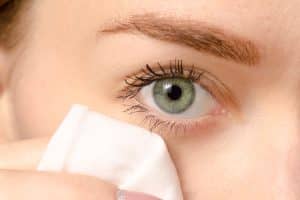Living with persistently blurred vision can be difficult. It can interfere with your ability to carry out everyday tasks such as reading, writing and driving – all of which can have a big impact on commitments like work and study.
If you’re experiencing persistent blurred vision, then you should visit your optometrist, who can help you to identify potential causes of the issue.[1] Below, we discuss various options to help treat and correct blurred vision.
Can blurred vision be corrected?
The right course of treatment to correct your condition will depend on what’s causing your blurred vision – which is why you should visit an optometrist. For example, if you have presbyopia which is causing your vision to seem blurred, then the treatment would likely involve corrective lenses.
Some causes of blurred vision can be very serious and require the involvement of a healthcare professional, while others are less critical and can be solved with simple, at-home fixes. It may be worth trying these fixes while you’re waiting for your eye appointment – especially if you’ve got a long wait or you’re struggling to get booked in.
Sometimes, blurred vision can have a fairly innocuous cause, such as an eyelash that’s fallen into your eye or a contact lens that’s come out of place. Try taking out your contact lenses, if you wear them, and bathing your eyes gently in sterilised water to remove any irritants.[1]
You might also find that blurry vision can come about as a result of eye strain or fatigue.[1] To fix this, you may need to make several adjustments to your daily habits. For example, you could use the 20/20/20 rule (every 20 minutes, look away from your screen at something at least 20 feet away for 20 seconds) to take more breaks from close work or screens, take steps to improve your sleep quality and reduce your overall screen usage.[2]
Another option is to check the strength of your reading glasses, if you have them. Our vision can change over time, so the strength of glasses that suited you before might not always be the best choice for you now. Unlike everyday glasses, reading glasses are fairly simple to change and don’t necessarily require the input of an optometrist – although it can be helpful to get their advice.
If you think you might need a new pair of reading glasses, head into a shop that allows you to try them on. That way you can test out different strengths to see which clears up your vision the best.
It is possible that certain medications can have an adverse effect on your vision, potentially causing blurriness. However, do not simply stop taking your medication, as this could cause other problems. If you think your medication could be affecting your sight, book a consultation with your doctor or a pharmacist to receive expert medical advice. They may be able to suggest alternatives that don’t cause these side effects, or else advise you on what you can do to rectify the issue.[1]
How do you fix dry eyes and blurred vision?
Another common cause of blurred vision accompanied by an itchy sensation in the eyes is dry eye syndrome. This is a condition where, for whatever reason, your eyes aren’t producing enough tears to keep your eye surface sufficiently lubricated. It’s a fairly common condition, and it can be exacerbated by excessive screen use, high heating or air conditioning usage or having dry air in your home or workplace.
Fortunately, dry eye isn’t considered to be serious, and there are plenty of methods you can use to reduce it. Since it can be caused by environmental factors, one of the best treatment options is to remove those factors – for example, by using a humidifier to add moisture to the air. This can be very effective for environments you have control over, but you may find your dry eyes come back when you’re elsewhere.
If that’s the case, then you can use a remedy such as TheraTears® Dry or Tired Eye Drops, which are formulated with hyaluronic acid, a compound found naturally in the body that helps you to retain more moisture. As well as helping you when you’re out and about, these eye drops can also be instrumental in soothing and hydrating your eyes while you work on adjusting the conditions in your home.[3]
Blurred vision can be caused by a number of things, and you should visit an eye doctor to help you get to the bottom of your condition. Fortunately, in many cases there are treatment options available to help you get back to the clear vision you used to have.
Resources:







